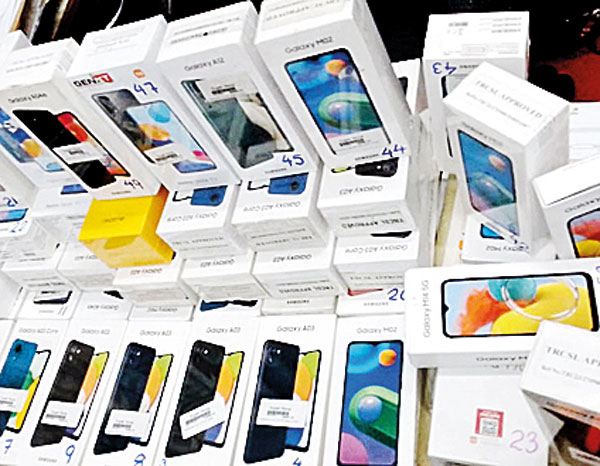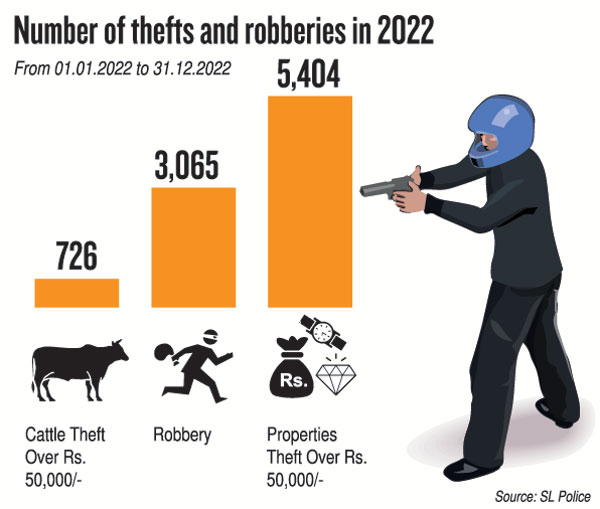News
Crime wave intensifies insecurity in the country
View(s):By Ryan Casiechetty
The investigations may be of lesser importance to the police, who are forced to pay attention to grave crimes reported, increasing numbers of shootings, and providing VIP security, but the impact on families affected by robberies will remain for months, if not years.
Last week, a group claiming to be from a security unit raided the residence of a motorcycle sales shop owner in Hambegamuwa in the Monaragala District, claiming they had information about archaeological items.
Holding the family at gunpoint in a room, the gang ransacked the almirahs and grabbed cash and gold jewellery worth more than Rs. 1.6 million.

Stolen mobile phones recovered from a Dam Street house. Pic by Akila Jayawardena
The police have yet to get a breakthrough, while the affected family lives in fear.
In another robbery in Thanmalvila, also in the Monargala District, a gang broke into the residence of a shopkeeper, forced him to go to his shop downstairs, and robbed him of Rs 186,000 in cash.
In Colombo, a young female bank employee walking home was followed by a motorcyclist, and her phone was snatched. She sought the help of a three-wheel driver to follow the bike, but the rider escaped. A complaint had been filed with the Foreshore Police.
An average of 25 robberies and thefts, including the theft of cattle and agricultural products, were reported on a daily basis across the country last year and are estimated to be around the same this year, according to police sources.
The police have been able to gain a breakthrough in some cases. They arrested three suspects involved in a spate of robberies of more than Rs 7 million worth of electrical items, foreign liquor, mechanical equipment, and laptops.
The same gang had been responsible for the robbery of the residence of the former ayurvedic commissioner (North Central) in Kolonnawa.
However, according to police sources, more than 50% of such robberies have yet to be resolved.
Retired senior DIG Priyantha Jayakody, who was in charge of the division handling crimes and organised crimes, told the Sunday Times that most crimes were being reported from the Western and Southern provinces. The Western Province has around 40% of the crime rate, and the Southern Province has around 15%. The police should mainly focus on these two provinces.
He said close to 70% of thefts, robberies, and housebreaking were done by professional criminals. He stressed the need for proper criminal supervision, adding that in the past decades, Sri Lanka’s crime rate and violence were monitored and controlled, but now he believes that it has changed.
“All police stations have their own intelligence group, but most focus on state intelligence. Therefore, criminal intelligence is being neglected. The community police at each station should be more responsible,” he said. 
“In each of these crimes committed, there is a ‘high invisible societal cost’ associated with them. For example, the public in a certain area is scared to travel on the roads at night, and females are scared to travel alone due to robberies.’’ He said the public should be more vigilant to prevent robberies and theft and take all possible precautions, such as keeping gates and doors locked and turning on an outside light at night. He said CCTV and security alarm systems could be installed. Also, the public should not hesitate to report suspicious activity.
H.M.G.B. Kotakadeniya, a former Senior Deputy Inspector General of Police, said the usual police duties to provide security to the public and the country were not being done by the police. “The public is being ignored, while their main priority currently is to safeguard politicians. A high number of officers are used to protect politicians. Also, a high number of police vehicles are used for politicians’ protection and security.’’ The social impact of crime has been high and can also impact the tourism industry.
Siri Hettige, professor emeritus of sociology at the University of Colombo, told the Sunday Times that there were different levels of impact on society due to crimes. The most vulnerable are those in poverty, the unemployed, the elderly, and children.
“The sense of insecurity is built up within the public. People’s happiness is ruined due to these happenings. A societal fear is also built up,’’ he said.
He said an environment should be created for the public to be secure. “The quality of life depends on public security.’’
Additional reporting by: Sumanasiri Gunatillake, Monaragala Correspondent
| 383 murders so far this year This year so far at least 383 murders have been committed in 373 incidents across the country, Police Spokesman SSP Nihal Thalduwa said on Friday. Of this number 65 were related to shooting incidents that claimed 41 people. SSP Thalduwa said that usually for a whole year, 500 to 550 murders are committed for reasons ranging from land disputes, family disputes and arguments. | |
The best way to say that you found the home of your dreams is by finding it on Hitad.lk. We have listings for apartments for sale or rent in Sri Lanka, no matter what locale you're looking for! Whether you live in Colombo, Galle, Kandy, Matara, Jaffna and more - we've got them all!

